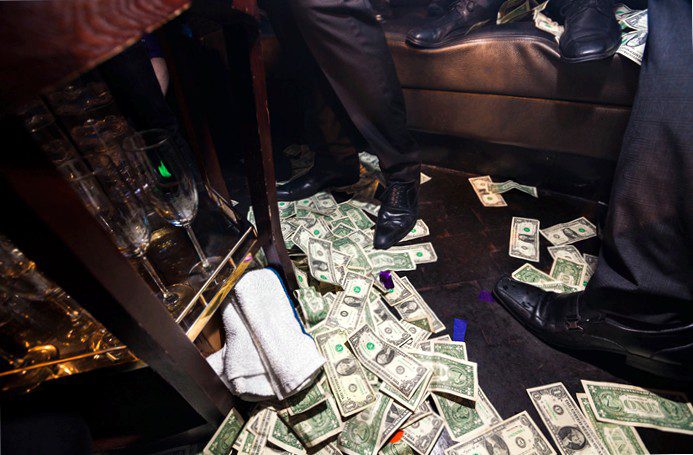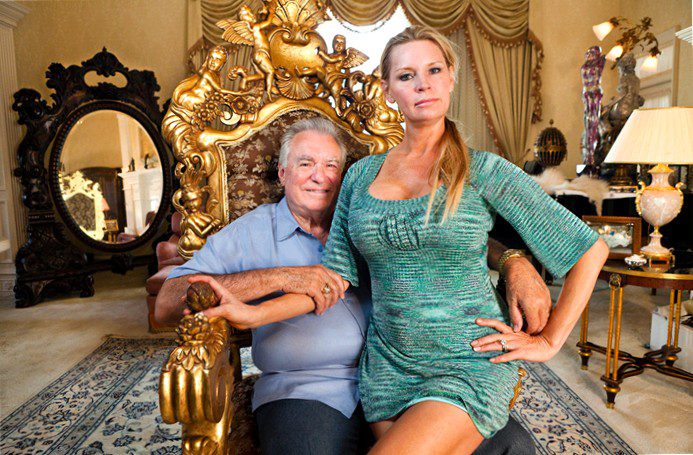In one of the oldest democracies of the world politics is made completely in the sense of its wealthiest citizens. How super-rich U.S. citizens are imposing their political agenda on the country
In January 2015, brothers Charles and David Koch announced plans to donate nearly $900 million, the equivalent of about 760 million euros, to the 2016 U.S. election campaign: a small cash infusion for Republican Party candidates. But for all their generosity, the Koch brothers are not fans of the Republican Party. On American television, older brother Charles defined his relationship with the party as follows: "The way I see it, the Democrats are going over the financial cliff at 160 into a broken society, the Republicans are only going 110."
"Democrats are going over the financial cliff into a broken society at 160, Republicans are only going 110"
The Kochs' political ideas can also be summed up like this: The state should stay out of it. They don't think much of universal health insurance or a minimum wage, they want less taxes and no environmental regulations – because they only disrupt their business. The brothers from Kansas own Koch Industries, the second largest privately held company in the U.S. The group includes chemical plants and cattle farms, oil refineries and thousands of kilometers of pipelines; about 120.000 employees produce a myriad of products from asphalt to fertilizer to toilet paper.
With an estimated fortune of more than 41 billion euros each, Charles and David Koch are among the richest people in the world. And they use their money to shape the USA according to their libertarian agenda – by far not only with generous campaign contributions.
Since the 1970s, the Kochs have built up a huge network that spreads their radical market ideas. Critics call the tangled web of lobby groups, think tanks, sponsored chairs, foundations and associations the "Kochtopus," or an octopus. One tentacle builds political activists – the Kochs have pumped millions into the right-wing Tea Party movement – the other tentacle produces research that benefits them. In this way, the Kochs have not only managed to sow doubt about the existence of man-made climate change, but have also ultimately helped the U.S. withdraw from the Paris climate agreement. Over the years, the Republican Party and the Koch brothers have become increasingly close.

They are by no means the only Americans who use their wealth to exert political influence. But in its dimension, the Koch brothers' influence is unique, there is no comparable organization on the Democratic side. Over all, most multibillionaires and billionaires tend to support Republicans. However, the Democrats also have extremely wealthy major donors, such as investor George Soros.
Money becomes a megaphone
Much of the super-rich's money flows into election campaigns. While no one in the U.S. is allowed to directly fund a candidate with more than 2.Support $700 per choice. But the Supreme Court has continued to loosen the rules in recent years with several controversial rulings. Donations, judges argue, are also a form of free speech. As a result, those who want to support a candidate or an issue are giving millions to so-called super PACs, fundraising clubs with sounding names like "Right to Rise" or "Make America Number 1". They are officially supposed to be independent of the candidates they campaign for, but in fact they are closely intertwined.
At the same time, super PACs allow wealthy big donors to massively promote their pet issues, shaping the political debate. Their money becomes a megaphone with which they can drown out the voices of others – or each other. For example, hedge fund billionaire Tom Steyer's main goal with his $91 million-plus super PAC was to get people talking about human responsibility for climate change again – after the Kochs had done much to negate the problem.

Tee off in the bedroom: Golfing is still one of the most exclusive sports
Just how much power people with a lot of money have in American politics is also evident from who actually holds the important offices. President Donald Trump has gathered around him a cabinet of millionaires and billionaires: bankers, investors, hedge fund managers. When Trump named the first 17 nominees to his administration in December 2016, an American online magazine calculated that those chosen had a combined wealth of $9.5 billion. That's more than the poorest 43 million U.S. households combined, they said. Three years ago, the Center for Responsive Politics also showed that members of Congress have long been much wealthier than the average American, and in 2013, for the first time, more than half of them were millionaires. Democratic politicians were, on average, even a tad richer than Republican ones.
The result of two researchers: It doesn't matter what the average American wage earner thinks about a proposed law
Will the interests of the rich be taken into account more by the rich as well? Political scientists Martin Gilens and Benjamin Page compared two data sets: on the one hand, nearly 1.800 polls surveying the opinions of U.S. citizens on specific policy decisions; on the other, how Washington has actually decided on these issues. They were looking at proposed laws from 20 years of U.S. politics, whether on taxes, education or environmental protection. Sometimes a Democratic president governed, sometimes a Republican one.
The conclusion of the two researchers: It doesn't matter what the average American wage earner thinks about a proposed law. Regardless of whether many or few members of the middle class back a bill, the likelihood that it will pass always remains about the same. Not indifferent to it: the opinion of the richest 10 percent of Americans. If they support a bill, the chances of it passing are much better. When they oppose a bill, Congress also says no in more than four out of five cases in Washington.

My House, My Wife, My Throne: Male Staging of Wealth. Once the photographer was there, many rich people proudly showed off their belongings
The fact that Americans have so far accepted or even supported the fact that the super-rich buy political influence and that laws correspond to the interests of the wealthy can probably only be explained by the fact that wealth – even excessive wealth – has a much more positive connotation in the U.S. than in Germany. "People like Bill Gates and Mark Zuckerberg are American heroes, almost nobody envies their money," says Martin Klepper, professor of American literature and culture at Humboldt University in Berlin. The American myth of the self-made man is responsible for this, i.e. the unconditional belief that if you are smart and capable, you will make it to the top. The traditionally good image of the rich also has religious roots. The Pilgrim Fathers, which in the 17. Those who settled in what is now the United States in the nineteenth century saw prosperity as proof of a life pleasing to God.
Approval is crumbling
"My feeling is, however, that this unconditional approval of wealth is now crumbling," says Klepper, "that people are increasingly questioning critically in the interests of which small group is being made policy there." Because anyone can see that the gap between rich and poor in the U.S. is widening, he said. In fact, an overwhelming majority of Americans now think money plays too big a role in campaigns and that campaign financing needs to fundamentally change. Lawrence Lessig, a Harvard University law professor, has long called for limiting the influence of big donors. One of his proposals is that every small donation from tax funds should be doubled so that politicians make more of an effort to do so.
In 2015, he even announced his presidential candidacy for the Democrats. Should he get the office, Lessig said, the first thing he would do would be to change the controversial campaign finance – and then resign, after all, that would set in motion the most important reform to save the U.S. from the super-rich. Whether this is true, you will not know at first. A few months later, Lessig quit, and Donald Trump later became president, a darling of billionaires.